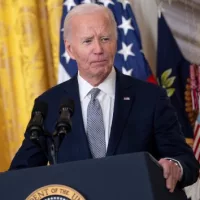
(NEW YORK) — Awkward dads and their eager children may not dance together on TikTok for much longer — at least not in the U.S.
The prospect of a nationwide TikTok ban has escalated from a theoretical possibility to a serious policy consideration, drawing growing support in Washington, D.C.
However, scant details are known about how the policy would be implemented and what it would mean for more than 100 million U.S.-based users of the app.
China-owned TikTok has faced growing scrutiny from government officials over fears that user data could fall into the possession of the Chinese government and the app could ultimately be weaponized by China to spread misinformation.
The Biden administration has stiffened its posture toward TikTok in recent weeks, endorsing a bipartisan bill earlier this month that would empower the federal government to ban apps like TikTok.
The administration’s stance hardened further this week, when officials demanded that TikTok’s Chinese owner sell its stake in the app or risk getting banned, the company and a U.S. official previously told ABC News.
A TikTok ban could take effect in a variety of ways, including its forced removal from Apple and Google app stores or an outright block of access by internet service providers, experts told ABC News.
While dedicated users would find ways to circumvent any government crackdown, the app would suffer a dramatic decline in popularity and eventually be rendered defunct, they added.
“The U.S. doesn’t typically ban websites like this — it would be very much uncharted territory,” Timothy Edgar, a computer science professor at Brown University and a former national security official, told ABC News. “It would be an enormous undertaking.”
TikTok did not respond to ABC News’ request for comment.
In response to bans of TikTok on some government devices, TikTok previously told ABC News in a statement: “We appreciate that some governments have wisely chosen not to implement such bans due to a lack of evidence that there is any such need, but it’s disappointing to see that other government bodies and institutions are banning TikTok on employee devices with no deliberation or evidence.”
“We share a common goal with governments that are concerned about user privacy, but these bans are misguided and do nothing to further privacy or security,” the company added.
Here’s what to know about the different ways the government could implement a nationwide TikTok ban, and what it would mean for TikTok users:
The removal of TikTok from app stores
A simple way to significantly curtail access to TikTok is in the form of a mandatory withdrawal of the app from major app stores, such as those maintained by Google and Apple.
Such a measure would bar new users and limiting existing ones, experts said.
“It would prevent new users from downloading and installing the app,” Qi Liao, a professor of computer science at Central Michigan University, told ABC News. “And the app would not be able to download updates, eventually becoming obsolete.”
The approach has gained support from at least one U.S. Senator. Last month, Sen. Michael Bennet, D-CO, sent a letter to Apple CEO Tim Cook and Google CEO Sundar Pichai, calling on their companies to remove TikTok from their respective app stores and cited concerns about how TikTok handles the data of American users.
Google and Apple did not respond to a previous request for comment about the letter.
Savvy users could get around such a ban by using offline app installation that bypasses the app stores, Liao said.
Still, an app store ban would immediately limit TikTok’s audience, he added.
“As soon as you ban TikTok on the app store, it’s going to make an impact,” Liao said.
A block of access to TikTok’s servers or IP address
A ban of the app could also take effect using a barrier that blocks access to TikTok’s web servers or its IP address, the experts said.
In such a case, attempts to access the app would fail because users would not be able to receive digital content from TikTok or reach its web host.
“It would do enormous damage to TikTok,” Edgar said.
The government could use a “sinkhole,” or a specially designed server that redirects web traffic when users try to reach illicit websites, such as child pornography or pirated material, Edgar said.
“Users may go to a page saying, “TikTok was banned by the U.S. government and this page was seized by the Department of Justice,'” Edgar said.
As with other approaches, users could elude the government-imposed barrier, experts said.
To access the app, users could use a Virtual Private Network, or VPN, which allows one to pose as a user logging on from a location abroad, thereby circumventing the U.S.-specific ban, Liao said.
“In China, it’s the reverse,” Liao said. “People use a VPN to access blocked U.S. services because the Chinese government has such censorship.”
Despite the readily available workaround, the effort required to log in from a VPN will deter many people from continuing their use of TikTok, Edgar said.
“One you’ve banned it, mainstream users may not want to take those kinds of risks — it may not be that important to them,” he said. “TikTok influencers will lose huge amounts of followers.”
A clampdown by internet service providers
A TikTok ban may take shape as a denial of access imposed by internet service providers, companies like Verizon and AT&T that deliver internet access for individuals, homes, businesses and other institutions, experts said.
Internet service providers could “totally block the TikTok network,” leaving all customers unable to access the app, Liao said.
A TikTok ban imposed by India in 2020 required internet service providers to deny customers the ability to use the app, Sarah Kreps, director of Cornell University’s Tech Policy Institute, told ABC News.
“This is a case where in the U.S. you’d have to get Verizon to essentially block this app,” she said.
Liao, who noted that India’s approach also mandated the removal of TikTok from app stores, said a denial of access by internet service providers would expand measures that some companies already take to prevent the use of specific websites, such as age-inappropriate content.
“They’re already doing lots of traffic shaping,” Liao said.
Customers could potentially get around a barrier from internet service providers, or ISPs, by using a different SIM card, the chip implanted in a mobile device that identifies a customer, Liao said. Users could also forego a SIM card altogether, he added.
“Then you’ll completely bypass the ISP-blocking of TikTok,” he said.
As with the other solutions, this approach would not eliminate access entirely but would shrink the user base, Kreps said.
“The hope with that would be to slow down the flywheel,” she said. “You’re not going to prevent every single user from using TikTok but that would certainly make it much more difficult to use.”
Copyright © 2023, ABC Audio. All rights reserved.















